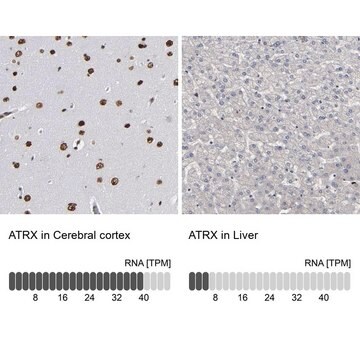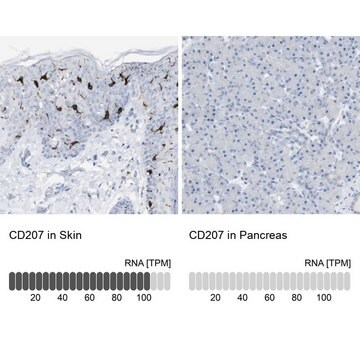254M-1
FLI-1 (MRQ-1) Mouse Monoclonal Antibody
About This Item
Polecane produkty
pochodzenie biologiczne
mouse
Poziom jakości
100
500
białko sprzężone
unconjugated
forma przeciwciała
culture supernatant
rodzaj przeciwciała
primary antibodies
klon
MRQ-1, monoclonal
opis
For In Vitro Diagnostic Use in Select Regions (See Chart)
Formularz
buffered aqueous solution
reaktywność gatunkowa
human
opakowanie
vial of 0.1 mL concentrate (254M-14)
vial of 0.5 mL concentrate (254M-15)
bottle of 1.0 mL predilute (254M-17)
vial of 1.0 mL concentrate (254M-16)
bottle of 7.0 mL predilute (254M-18)
producent / nazwa handlowa
Cell Marque®
metody
immunohistochemistry (formalin-fixed, paraffin-embedded sections): 1:25-1:100
izotyp
IgG2b
kontrola
pnet
Warunki transportu
wet ice
temp. przechowywania
2-8°C
wizualizacja
nuclear
informacje o genach
human ... FLI1(2313)
Opis ogólny
The FLI-1 gene and FLI-1 protein are best known for their critical role in the pathogenesis of ES/PNET. More than 85% of ES/PNET are characterized by the translocation t(11;22)(q24;q12) that results in the fusion of the ews gene on chromosome 22 to the FLI-1 gene on chromosome 11. FLI-1 is a member of the ETS (erythroblastosis virus-associated transforming sequences) family of DNA-binding transcription factors and is involved in cellular proliferation and tumorigenesis. FLI-1 is normally expressed in endothelial cells and in hematopoietic cells, including T lymphocytes. The immunohistochemical detection of FLI-1 protein has been shown in two recent studies to be valuable in the discrimination of ES/PNET from most of its potential mimics, with the notable exception of lymphoblastic lymphoma.
The FLI-1 gene has also recently been shown to play an important role in the embryologic development of blood vessels. Expression of FLI-1 protein in adult endothelial cells in all types of blood vessels (arterial, venous, and lymphatic) has previously been shown both in our previous work and in that of Nilsson et al.
Folpe et al. found FLI-1 to be a highly sensitive (92%) and, with regards to the cases evaluated in this study, specific (100%) marker of both benign and malignant vascular tumors. The “absolute specificity” of FLI-1 is of course lower, given its expression in ES/PNET and lymphomas. FLI-1 expression appears to be the first reliable nuclear marker of endothelial differentiation. In particular, Folpe et al. found that FLI-1 reliably distinguished epithelioid forms of angiosarcoma from two important mimics, epithelioid sarcoma and carcinoma.
Assoc. products: WT-1, CD99, Synaptophysin, Chromogranin A, CK AE1/AE3
Jakość
 IVD |  IVD |  IVD |  RUO |
Powiązanie
Postać fizyczna
Uwaga dotycząca przygotowania
Inne uwagi
Informacje prawne
Nie możesz znaleźć właściwego produktu?
Wypróbuj nasz Narzędzie selektora produktów.
kontrola
Wybierz jedną z najnowszych wersji:
Certyfikaty analizy (CoA)
Nie widzisz odpowiedniej wersji?
Jeśli potrzebujesz konkretnej wersji, możesz wyszukać konkretny certyfikat według numeru partii lub serii.
Masz już ten produkt?
Dokumenty związane z niedawno zakupionymi produktami zostały zamieszczone w Bibliotece dokumentów.
Nasz zespół naukowców ma doświadczenie we wszystkich obszarach badań, w tym w naukach przyrodniczych, materiałoznawstwie, syntezie chemicznej, chromatografii, analityce i wielu innych dziedzinach.
Skontaktuj się z zespołem ds. pomocy technicznej







